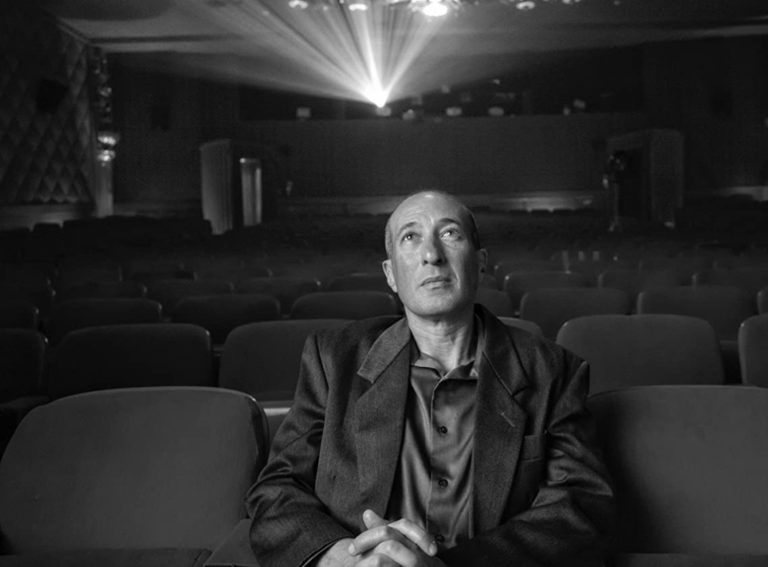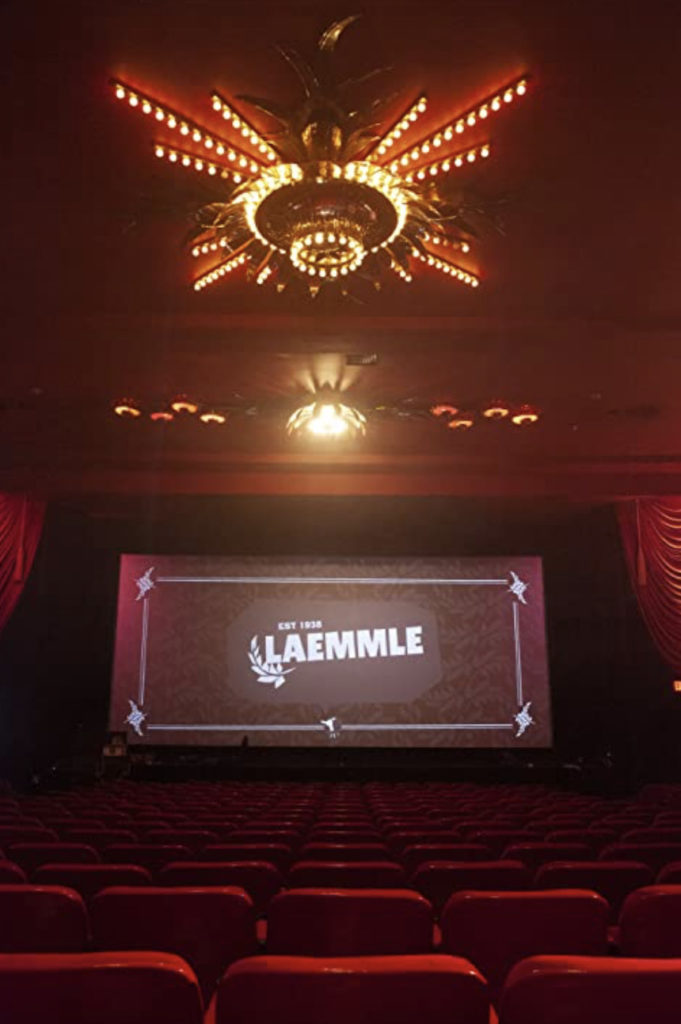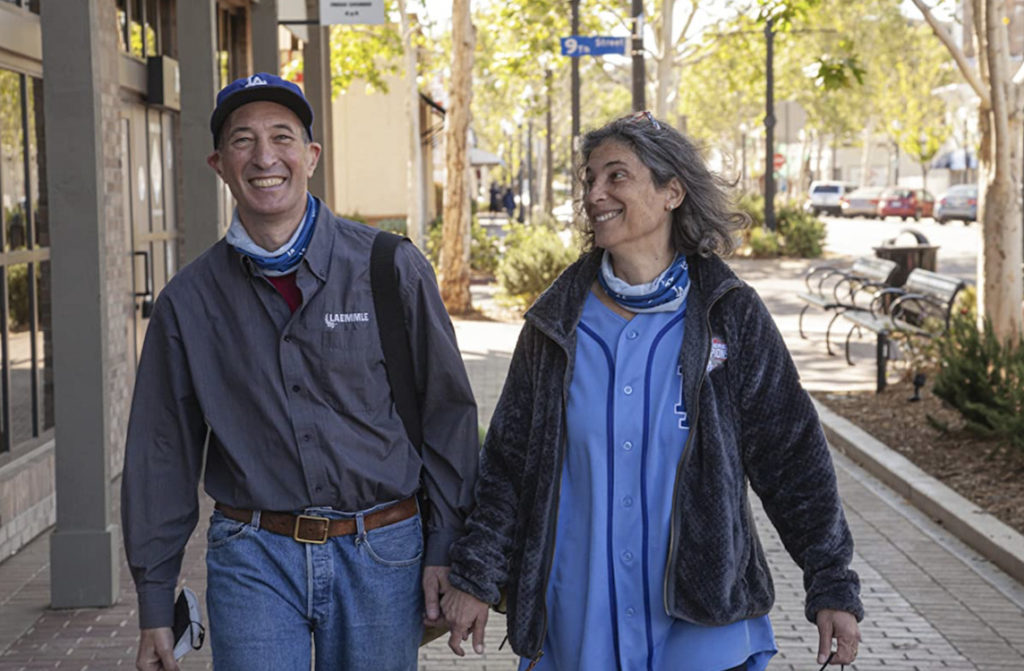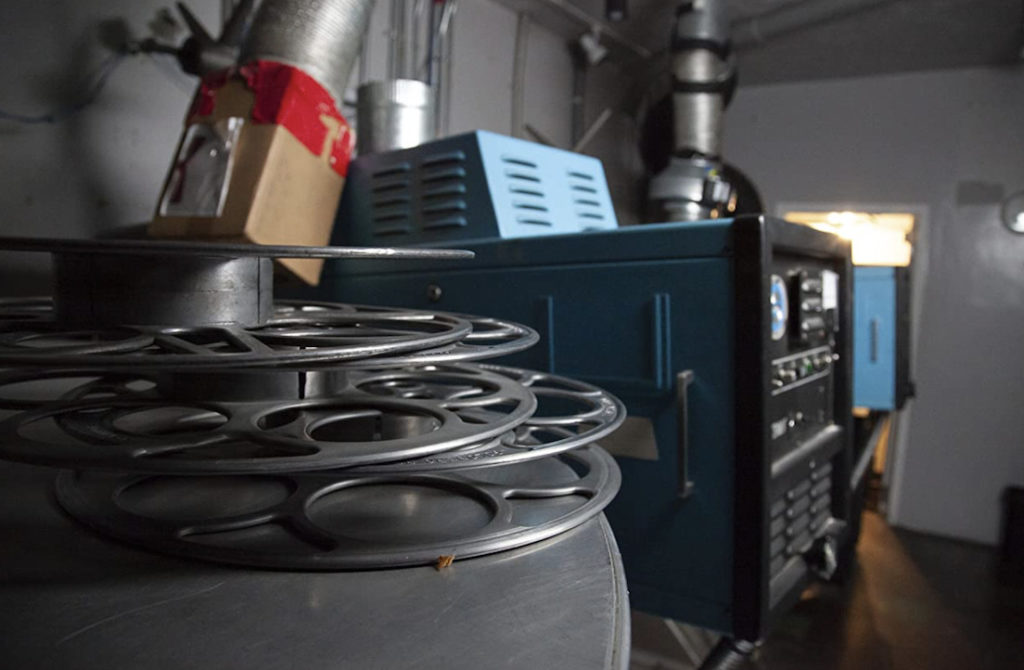
Synopsis :ONLY IN THEATERS, a film by actor/director Raphael Sbarge, is an intimate and moving journey taken with the Laemmle family, spanning nearly three years of challenges, losses, and personal triumphs.

Q: How did the Laemmle family open the door for you to film this documentary? What was your pitch, initially?
RS: Greg [Laemmle] was familiar with my work. He had seen some of my other docs that I had done which had generally been focused on probably more socially relevant issues. And I had done another piece that was also focused on history that was for PBS [“LA Foodways”, 2019] and was nominated for an Emmy. I believe he had a sense of my work.
But I approached him and he said “Come meet the family.” I met his father [Robert Laemmle], who is 85, and then he told me about his great-aunt, who was 103 at the time. They seemed open to this. At the time, though, the intent of this was really focused on trying to do a doc that was really about the legacy story — and the legacy story is astounding.
This family reaches all the way back to the origins of Hollywood, and this great immigrant story of escaping the Holocaust and coming to America and leaving this profound legacy of supporting filmmakers and really elevating the art of film. That seemed like an incredible story just there to tell, and that’s really where I came from initially, and they seemed open to that.
What happened after that was a series of remarkable encounters that we had not prepared for and was not planned, in a classic documentary fashion. At some point, the story starts to go this way and you think you’re going that way, and you have to make a choice. Do I tell the story I thought I wanted to tell, or do I continue to veer with it? Thanks to a crew who really trusted me and really had faith in me and really also felt the importance of this story, they stuck with me — many of them working on deferments or limited funds.
This is a classic independent film that emerged out of the moment, and from there it grew. That’s where we then started reaching out — we did a presentation and it got a lot of attention, and it got distributor interest. We got interest from Ava DuVernay and Cameron Crowe, and James Ivory and Bruce Joel Rubin and Allison Anders and all these remarkable people who were open to talking about this.
My understanding is that Cameron Crowe doesn’t do interviews. He just doesn’t. You can’t find Cameron Crowe interviews, they’re very hard to find. But he wanted to talk to us, because specifically he had felt inspired by the Laemmle theaters. But there were others that we spoke to that were touched by the Laemmles, but also really spoke to how the film experience really is what inspired them to be filmmakers.
That also is this other story of what this art form is and how it translates. And then we backed into this larger story about what’s happening with the future of exhibition.
Q: Greg Laemmle is a very warm personality. What was it like to meet him and then go through this process with him?
RS: Yeah. The way that I met him — and I speak to this briefly in the film, which is why I put myself in the movie — is because if you want to show your film in the Los Angeles area, as filmmakers, you go to the Laemmle theaters. It’s kindof the gold standard, it’s where independent filmmakers show their films.
I had called the Laemmle Theaters trying to book a screening, and I talked to Greg Laemmle. I mean, Greg Laemmle takes these calls. It’s astounding to get the man with the name above the title talking to you about your film. And it was clear that he was a good business man, he wasn’t just going to hand it to me, but at the same time I felt this was a kind gentleman who clearly cared about filmmakers, and wanted to make it work. He wasn’t being a jerk, which is what we expect.
It’s such a hard road when you’re an independent filmmaker and you’re outside the studio system and people don’t necessarily know your full breadth of work. How do you do that, how do you connect with people, and small acts of kindness are profound.
I had a friend of mine who saw the film and he said “You know, I have my Oscar today because of the Laemmle Theaters.” Because they qualified his short and he got his Oscar. And Ava DuVernay talked to us because Greg had been kind to her. She had called, similar to me, to try and get some screenings and Greg had helped set that up. So in this dynamic of filmmaker to film exhibitor, that’s how I [got set up].
After that, [Greg] really took this in and he really met us where we were. He came to this with enormous honesty and a really clear sense of respect for the medium, knowing that documentaries when they are good and when they are really working, you know they’re honest and they are not trying to “spin” — there’s something authentic about them. He trusted me and — you’d have to ask him, I guess, but there’s some part of him that understood that I really was intent on telling a story that was really about a family. Yes, it’s a multi-generational business, and a family business.
Whether you know about Laemmle Theaters or not, whether you live in New York or Chicago or L.A. or wherever else you might be, and you’ve never heard of Laemmle, maybe there’s a [movie] house in your town that might be similar.

Q: I usually go to the Angelika Film Center, that’s actually the good indie film house, or maybe Anthology Film Archive, or Film Forum —
RS: Right? And then of course, there were lots of them when I was growing up. There was the Thalia, there was the New Yorker, the 8th Street Playhouse, and then of course, the most important one here in New York — which is now also closed — is Lincoln Plaza. These are all cinemas that were integral to and were cultural centers. And they’re gone. So this is basically a story about this specific city [of L.A.], but I believe it really translates [to] what we’ve seen here in New York with so many theaters having closed.
In addition to that, it’s a family business, and it’s multi-generation family business. Three- and four-generation businesses are complicated. They’ve got difficult things that they have to orchestrate. And that’s where it becomes an American story and a story about the American Dream of trying to make it work.
Q: How did they select the films that they chose to play in the theaters? In the Sixties, the films were influenced by Italian Neorealism and French New Wave. How about their selections now?
RS: That’s really a question for Greg. But my understanding is that Greg really takes very seriously what plays on the screens. I believe in some ways he’s interested in providing a wide array of films across spectrums. He’s not trying to be a cultural arbiter. For example, there’s a great story in this film about how he helped “The Room”, which is arguably one of the most famous “worst movies ever”, right? But it had an audience and he basically gave it a platform.
He’s not trying to say which is good or bad. He’s just trying to basically give independent voices — that is, independent documentary informed films — opportunities to be able to meet an audience. And again, because it’s a family business, there’s a level of integrity and there’s a level of personal mission from the family that they really care about film, and you feel that.
You can walk into a Laemmle like you walk into Film Forum or like you can the IFC [International Film Center] or any number of other wonderful theaters here in New York that program great films, and know that most days, you’re going to see something really interesting. You’re going to see something likely without a superhero in it, and you’re going to see something that appeals to your mind and your heart, and may take you to a place that you are not familiar with. But it then opens you up to other cultures or other ways of thinking, and hopefully, evolves one’s way of thinking about the world. That’s what great movies can do. And that’s what these theaters obviously stand for.

Q: Speaking of generations, can you talk about Carl Laemmle, who founded Universal Pictures?
RS: Yeah, Carl Laemmle is a fascinating character. There is another movie about Carl Laemmle, just dedicated to Carl Laemmle [“Carl Laemmle”, written & directed by James L. Freedman, 2019], and I recommend it. He is a super dynamic, remarkable man. He was a German Jew who basically emigrated here in the 1880s and really came here wanting to work as a machinist or an engineer. And because he was a Jew, he couldn’t because of the obvious [anti-semitism].
So the story was, he was living in Chicago and he saw a bunch of people lining up at a place of business, leaving their money behind and taking nothing with them. What was it? It was a nickelodeon, which at the time was the first cinema, and this was basically cinema that had been created by Thomas Edison. And it was owned exclusively by the Edison Trust, which was essentially a series of patents that then had been corralled around the making of the movie. Edison was much more interested in the technology than he was in the content. He didn’t want to promote actors, for example, because he didn’t want to give them power. He just wanted the movie itself to be the thing, and he wanted to be the purveyor of this new magic cinema idea.
Laemmle wanted to make a movie. First he saved up — he was one of those fellows who saved pennies, pennies, pennies — and he was able to get enough money to buy a nickelodeon. It did very well, and he was able to open another one, and another one. And from there he then wanted to make a movie.
The Edison Trust sued him. It’s hard to imagine how big — a total David-and-Goliath story. This little four-and-a-half-foot, pugnacious German Jew who said, “This is ridiculous, they can’t own cinema. Cinema started in Europe.” They basically went all the way to the Supreme Court. And Carl Laemmle won, and because he won, we have independent cinema today. We would all have been under the umbrella of Thomas Edison had this not happened.
From there, then, he left and went as far away as he could from Fort Lee, New Jersey, where they were making most of the movies, and went to Los Angeles, bought a bunch of farm land, and opened a movie studio called Universal Pictures. He did something like five hundred movies, including “The Hunchback of Notre Dame”, “Phantom of the Opera”, “All Quiet on the Western Front”. He discovered people like Myrna Loy, Rudolph Valentino, and a young illustrator named Walt Disney. He had an amazing eye for talent.
He also had this other thing which was fascinating: he had this passion for his home country. As the “winds of war” were happening in the late Thirties, he began to work to bring people over to the United States and save them. So he was a Schindler of sorts. He called himself “Uncle Laemmle” and basically, because he was a very wealthy man, he was able to sponsor some 350 people and bring them over. And they would work at Universal Pictures, work off their board, as it were, their travel costs, and then they’d be here.
Two of the people he brought over were his cousins, which in this case were Max and Kurt Laemmle, and they worked at Universal and bought a local movie theater. Max Laemmle came from Europe, he loved European ideals, he loved the ideas of art and philosophy and culture. So it absolutely Max Laemmle who brought foreign film to Los Angeles, and really influenced that around the country as being a really dynamic way to program for theaters.
Having art house cinema, world cinema, in Los Angeles at the time was a profound transmission point for a lot of other Hollywood films that then got influenced by these great films, such as the French New Wave. And by the way, they won the French Order of the Legion of Honor [Ordre national de la Légion d’honneur] for what they did for the French New Wave. Or whether it be the Japanese New Wave or the Australian New Wave.
They brought Ingmar Bergman over, and [François] Truffaut used to come for lunch. They really embraced European culture as something outside of the American ideal, which we know is obviously sort of self-perpetuating and often doesn’t look outside its borders. In this case, this was someone who, because he was a German who really had profound ties to his home country, this was about bringing that to America. And he bet on that, and he won. And because of what he did, there were so many people who were influenced, both filmmakers and careers that were made because of this support that he gave at ground level — really on the ground, with this platform to elevate their films.

Q: Filmmakers such as Bergman and Truffaut would go to the Laemmles’ house to visit and even have lunch. Those kind of things don’t happen these days.
ES: Yeah. One of the people I interviewed talked about it. It was an interesting relationship in that these European directors were fascinated with the allure of Hollywood. They were obviously as caught up as the rest of the world was with this extraordinary amount of great films that were being produced in the United States and, obviously, the power of Hollywood.
I think that someone would want to reach out and bring them there and include them in this place and give them a platform. Max Laemmle is the one who did it. From what I understand, Bergman at the time was a household name. He was still an evolving filmmaker and this was, again, part of this sense of mission — bringing culture to the city, bringing great artists, elevating the art of film.
We live in a world of constant conglomeration, right? Here we’ve got multinational corporations basically deciding how films get cut, or how they get seen, or where they get seen. Or this horrible day-and-date thing that happens now, where they open for a week in a movie theater and then they go immediately online at the same time. Art and commerce have mixed in this very tough way that is affecting the art form, and that’s what everyone I spoke to spoke about.
This 125-year-old art form which is built around this solo experience in a dark room with other people and a large 40 by 60-foot screen, and the ability to kindof step into something — like step out of one’s life and into another point of view and be carried. That’s the design of this and there’s a great deal of shifting and a fair amount of agony and painful growing pains as to where we’re headed next.
I go back to, here we have a family business that cares about filmmakers, cares about film, cares about the integrity of the medium. I believe that the Laemmles have a way of telling this story because of this Hollywood legacy story. But there are clearly other theaters that do this. We’ve now played at a bunch of them, and we’re about to open at the IFC — another theater that has a tremendous tradition of showing great films — and also the new Plaza. There’s the Huntington in Long Island. There’s so many places that still cherish these films that are outside the mainstream, for those of us as filmmakers who are trying to find a way up and out.
Which is almost impossible. You know, if you don’t work for Netflix and you can’t get on Netflix, how do you get seen? How do you get discovered? How does anyone find their way through all the noise? Well, it’s independent films and it’s independent cinemas that basically help us find our way.
In the words of Arthur Miller in “Death of a Salesman”, “Attention must be paid.” Right? So this is our opportunity to pay attention to a remarkable and unique and precious thing for audiences, but also for filmmakers.
Q: What effect has this theater experience had for the greater L.A. area?
RS: The Laemmle theaters in Los Angeles are more than just a movie theater, it’s a cultural institution. They do so much, and they provide so many ways into a conversation and so many ways to really enrich our lives. Living on a diet of TikTok and Instagram, people looking for ways to really know the difference between “movies” and “cinema”.
Cinema speaks to your soul, and having someplace that really is committed to that, that that is their sole mission, is an extraordinary thing. I know that [greater] Los Angeles is struggling with where the future of exhibition is. I know New York is as well.
Again, the Lincoln Plaza, which remains — it’s sitting there empty for five years now. Just empty. Whoever owns the theater would rather it be empty than show anything. It’s a hole in the universe that can’t be repaired. Cinépolis, a theater in Chelsea, just closed, they just announced being closed. These theaters, once they’re gone, they’re gone forever.
I believe that we have an opportunity to vote with our feet. I believe that if movies matter to you and if it’s a precious thing, then hopefully, the cause within this movie is to be able to remind people of how important it is to go. And if the pandemic taught us anything, sitting at home on our couch and watching whatever, aren’t you sick of that? Isn’t it time to get out? And go back out and visit a movie theater? We’ve all been locked at home for so long.
So this is a reminder of how important it is. But this is not a pandemic thing, it’s not a streaming thing. It’s really about just being reminded that the movie experience is an experience, and that’s what this is about.
Q: Thank you.
Check out more of Nobuhiro’s articles.
Here’s the trailer of the film.

